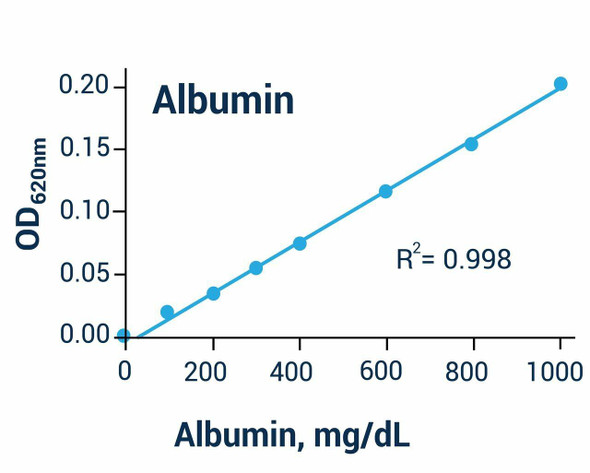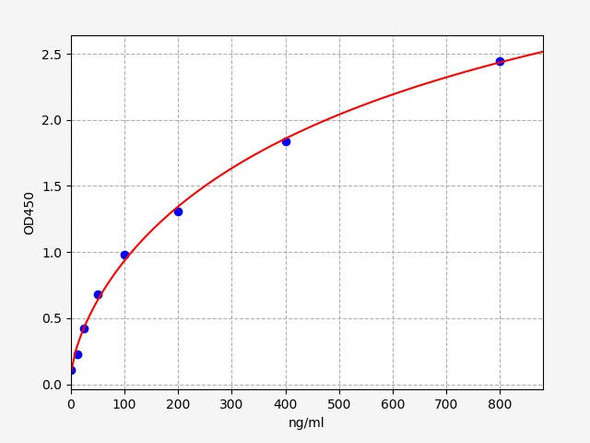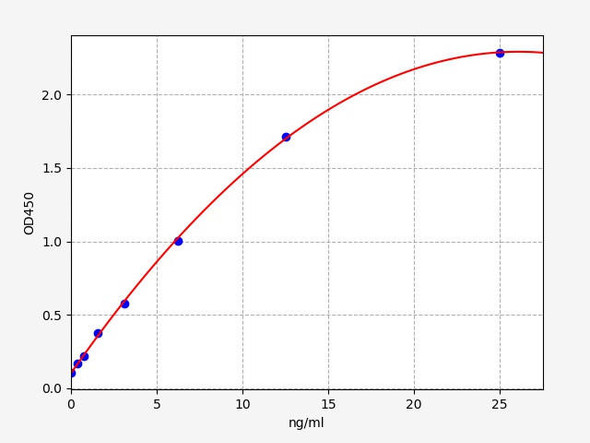BCP Albumin Assay Kit - Information
Assay Genie's BCP albumin assay kit is designed to measure albumin directly in biological samples without any pretreatment. The improved method utilizes bromcresol purple that forms a colored complex specifically with albumin. The intensity of the color, measured at 610nm, is directly proportional to the albumin concentration in the sample. The optimized formulation substantially reduces interference by substances in the raw samples.
Applications
For quantitative determination of albumin.
BCP Albumin Assay Kit - Key Features
- Sensitive and accurate. Use as little as 20 samples. Detection range 0.3 - 5 g/dL (45 - 750 ) albumin in 96-well plate assay.
- Simple and high-throughput. The procedure involves addition of a single working reagent and incubation for 5 min. Can be readily automated as a high-throughput assay for thousands of samples per day.
- Improved reagent stability and versatility. The optimized formulation has greatly enhanced reagent and signal stability. Cuvet or 96-well plate assay.
- Low interference in biological samples. No pretreatments are needed. Assays can be directly performed on raw biological samples i.e., in the presence of lipid and protein.
BCP Albumin Assay Kit - Data Sheet | |
| Kit Includes | Reagent: 50 mL Albumin Standard: 2 mL 5 g/dL BSA |
| Kit Requires | Albumin standards other than BSA, mouse, rat . Pipetting devices and accessories, clear flat bottom 96-well plates and plate reader or spectrophotometer and cuvettes for measuring OD at 610 nm. |
| Method of Detection | OD610nm (BCP) |
| Detection Limit | 0.3 g/dL |
| Samples | Serum, plasma, urine, biological preparations |
| Species | All |
| Protocol Length | 5 min |
| Size | 250 tests |
| Storage | Store Reagent and standard at 4°C and -20°C, respectively |
| Shelf Life | 12 months |
More Details
Albumin is the most abundant plasma protein in human. It accounts for about 60% of the total serum protein. Albumin plays important physiological roles, including maintenance of colloid osmotic pressure, binding of key substances such as long-chain fatty acids, bile acids, bilirubin, haematin, calcium, magnesium. It has anti-oxidant and anticoagulant effects, and also acts as a carrier for nutritional factors and drugs, as an effective plasma pH buffer. Serum albumin is a reliable prognostic indicator for morbidity and mortality, liver disease, nephritic syndrome, malnutrition and protein-losing enteropathies. High levels are associated with dehydration. Simple, direct and automation-ready procedures for measuring albumin concentration in biological samples are becoming popular in Research and Drug Discovery.
Aliases for ALB Gene
- Albumin
- SerumAlbumin
- PRO0883
- PRO0903
- PRO1341
- HSA
Entrez Gene Summary for ALB Gene
This gene encodes the most abundant protein in human blood. This protein functions in the regulation of blood plasma colloid osmotic pressure and acts as a carrier protein for a wide range of endogenous molecules including hormones, fatty acids, and metabolites, as well as exogenous drugs. Additionally, this protein exhibits an esterase-like activity with broad substrate specificity. The encoded preproprotein is proteolytically processed to generate the mature protein. A peptide derived from this protein, EPI-X4, is an endogenous inhibitor of the CXCR4 chemokine receptor. [provided by RefSeq, Jul 2016]
Serumalbumin, the main protein of plasma, has a good binding capacity for water, Ca(2+), Na(+), K(+), fatty acids, hormones, bilirubin and drugs. Its main function is the regulation of the colloidal osmotic pressure of blood. Major zinc transporter in plasma, typically binds about 80% of all plasma zinc.
Protein details for ALB Gene (UniProtKB/Swiss-Prot)
Protein Symbol:P02768-ALBU_HUMANRecommended name:Serumalbumin
Protein Accession:P02768
Secondary Accessions:E7ESS9, O95574, P04277, Q13140, Q645G4, Q68DN5, Q6UXK4, Q86YG0, Q8IUK7, Q9P157, Q9P1I7, Q9UHS3, Q9UJZ0
Protein attributes for ALB Gene
Size:609 amino acids
Molecular mass:69367 Da
Quaternary structure:No Data Available
SequenceCaution:Sequence=AAF22034.1; Type=Erroneous initiation; Note=Translation N-terminally extended.; Evidence={ECO:0000305}; Sequence=AAF69644.1; Type=Erroneous initiation; Note=Translation N-terminally extended.; Evidence={ECO:0000305}; Sequence=AAG35503.1; Type=Erroneous initiation; Note=Translation N-terminally extended.; Evidence={ECO:0000305};
Post-translational modifications for ALB Gene
- Acetylated on Lys-223 by acetylsalicylic acid.P02768-ALBU_HUMAN
- Glycated in diabetic patients.P02768-ALBU_HUMAN
- Kenitra variant is partially O-glycosylated at Thr-620. It has two new disulfide bonds Cys-600 to Cys-602 and Cys-601 to Cys-606.P02768-ALBU_HUMAN
- Phosphorylated by FAM20C in the extracellular medium.P02768-ALBU_HUMAN
- Ubiquitination at Lys 229NX_P02768
- Glycosylation at Lys 36, Lys 75, Lys 161, Lys 186, Lys 223, Lys 249, Lys 257, Lys 300, Lys 305, Lys 337, Lys 341, Asn 342, Lys 347, Lys 375, Lys 402, Lys 437, Thr 444, Lys 463, Lys 468, Asp 518, Lys 549, Lys 558, Lys 560, Lys 569, and Lys 597NX_P02768
- Modification sites at PhosphoSitePlusP02768












